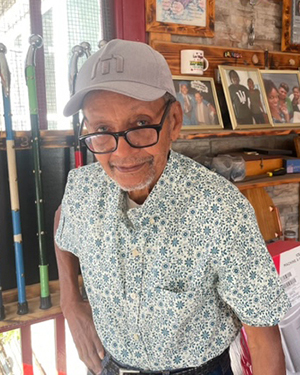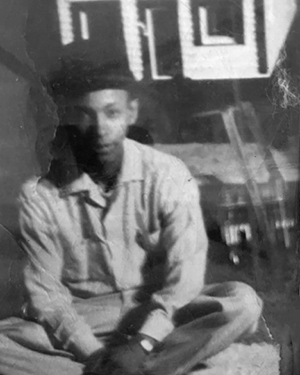U.S. Air Force Korean War Chicago, IL Flight date: 09/20/23
By Charlie Souhrada, Honor Flight Chicago Veteran Interview Volunteer
While political powers battled for supremacy during the Cold War, Airman Jesse Kimp was just trying to keep warm while serving late night guard duty in Alaska Territory.
“I was born and raised in Chicago, so I knew cold,” he remembers. “Chicago is a wet cold. Alaska is a dry cold. There’s a big difference!”
The second eldest of Charles (Charlie) and Ora Kemp’s six children, Jesse was born in November 1933. He spent his childhood attending Chicago’s Wendell Smith Elementary School and off hours playing with family and friends. Meanwhile, his father and mother worked at Carnegie Steel and Continental Can respectively.
As a teenager, Jesse attended Crane Tech High School, then left school to start working with his father at the steel factory. “My job was to grade the steel and paint the grade on the steel bars,” he says.
In 1952, Jesse needed a change and joined the Air Force. “I decided to enlist,” he remembers. “A bunch of us started talking about it. We were just kids who didn’t know what we wanted. One day, we decided to go do something and a bunch of us went in at the same time.” Over time, his older brother Charles, and one of his younger brothers, Julius, also served in the Air Force.
Upon entering the service, the spelling of Jesse’s last name was officially changed due to a clerical error on his birth certificate. Based on the error, the Air Force recognized his last name as “Kimp,” rather than the family name, “Kemp,” and the change stuck. “I never looked to change it back,” he says. Instead, Jesse didn’t let the spelling change or basic training at Lackland Air Force Base in San Antonio get him down. “Everybody gets chewed out. I was used to it. I just wanted to avoid KP duty!”
After completing basic, Jesse was sent to Eielson AFB, 26 miles southeast of Fairbanks, Alaska, where he was assigned to the 5010th Air Police Squadron. “Our job was to guard airplanes. We were close enough to hear “Moscow Molly” who gave us Russian propaganda on the radio. We didn’t buy it, but she played good music!”, he says. He also remembers the howling, singing wind, and cold, biting temperatures that came with it. “Your finger might stick to the trigger if you weren’t careful, so you learned to shove your hands in your armpits, or in your crotch to keep them warm!”
One day, while serving guard duty, a group of officers came to his post, and he remembers having to muster up the courage to stop them and ask for a security pass. “This general pointed to the stars on his lapel and said, ‘this is my pass!’” Jesse stood his ground and gave clearance only when the proper passes were displayed. Two hours later, his sergeant called him in and Jesse thought “oh, oh, here it comes!” Instead, he was invited to sit down and told he did “one hell of a job!”


At the time, Alaska was still a territory which meant Jesse earned $79 per month for “overseas” pay. “We had a lot of free time, but not enough money to do much,” he says. “A hamburger was expensive, and I quit smoking and drinking because those things cost too much.” Instead, he sent his pay home to his mother, played guard on a base basketball team, and helped his team win a championship in 1953.
In 1955, Jesse was transferred to Sampson AFB, in Geneva, New York. Sampson, which is now closed, provided basic military training. On the base, his duty was to “serve and protect,” like a civilian police officer. “During this time, we had so many wild dogs on the base that they made me the ‘dog catcher.’ I didn’t have to catch dogs, but this gave me an excuse to join the basketball players in the gym as much as I wanted!”
In 1956, Jesse earned an early, honorable discharge and went back home to Chicago. There, he enrolled in the trade program at Dunbar Vocational Career Academy, where he learned carpentry skills, graduated in 1958 and started a construction job. In 1962, he headed to Los Angeles, hoping to build additional skills and expand his opportunities. There, he learned how to install cabinets and hang doors, then came back to Chicago one year later where he’s lived ever since.
In the late ‘60s, Jesse met his wife, Earlene, through one of her sisters, and the couple will celebrate their 56th anniversary in October. In 1987, he took a job with the Chicago Park District, joined the carpenters’ union, and retired in 2001. Nowadays, he enjoys his large, loving family, including children – Corwin, Tiara, Hope, Adrianne, Jose, and two grandchildren – Jalen and Mya. He also enjoys spending time in a three-season room that he built on his house. There, he, and Earlene entertain, play cards, and plan their frequent trips – mainly to Las Vegas. “We’re always traveling, and we love to play cards!”
Thank you, Jesse, for serving and protecting. We hope you enjoy your Honor Flight!


